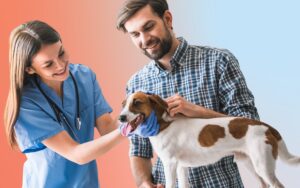Courtney Post: Welcome to Let’s Vet Together. Before we dive into our conversation today about our Graduation to Ownership Business Fellowship, I want to kick off this talk, just like we do every one of our episodes, with giving our guest an opportunity to introduce herself, and also talk about if she brought any local treat that she’d like to share with listeners. I’d like to turn this over to my awesome guest, Dr. Daia Lopez. Can you please introduce yourself?
Daiannette Lopez, DVM: Hi, my name is Daiannette Lopez. Wow, hearing doctor before that is exciting.
Courtney: It’s real. This is our first conversation where Daia is officially a doctor when her and I are connecting. That was very purposeful that I introduced you as that, Daia.
Dr. Lopez: Thank you. My name’s Daiannette Lopez, but I go by Daia. I’m a veterinarian, and I just moved to Chicago, so I’m still getting to know the local places, but I lived in New York for a summer, and I fell in love with this bakery, Levain Bakery. They have one in New York and one in DC, and then actually when I was in my interview at Chicago, the place that I chose, across the street, they were opening a new Chicago location. I was like, “This is–“
Courtney: That’s a sign.
Dr. Lopez: Levain Bakery, if you haven’t been, you should visit.
Courtney: What is your favorite treat from this bakery? Because as I come to visit you in Chicago and see West Loop, I’m going into this bakery, what am I choosing Daia?
Dr. Lopez: You have to get the chocolate walnut cookie.
Courtney: Done.
Dr. Lopez: Hands down, the best cookie I’ve ever tried.
Courtney: Oh, wow. I love that you were destined to be at this hospital. You were destined to be in Chicago. You actually just manifested that bakery, your favorite bakery across the street. Why don’t you give us a little bit about your background and your journey to becoming a veterinarian? Then we’ll talk a little bit about where you are today.
Dr. Lopez: All right. I like to say that I enjoy stepping out of my comfort zone. I have moved to a couple places trying to get a career in veterinary medicine. I was born and raised in Puerto Rico until I was 18. We don’t have a veterinary school there, so I always knew that I needed to leave, unfortunately. Then for undergraduate, I went to University of Georgia. I knew that I wanted to do vet school, so I tried to go to an undergrad that had a good vet school. I did that. Go dogs.
Then I went to North Carolina to pursue my career in veterinary medicine. Then now I moved to Chicago with my fiancé and our two dogs to officially start my career in the industry.
Courtney: Awesome. Just last night at dinner, I’ll share with you, Daia, that I was chatting with my daughters about my affinity to any university that has a dog as a mascot. You both undergrad and your veterinary school, two dogs, and I didn’t even think about our podcast today. I was just sharing with them that I tend to root for a team that has a dog as a mascot. It’s logical.
Dr. Lopez: It just makes sense.
Courtney: Yes. Super logical. You are in the inaugural class of our graduation to ownership, our GO Business Fellowship. For those listening that are not familiar with GO, this is a program for early career veterinarians for someone just like Daia, who have just graduated veterinary school, is going to go work in an awesome hospital, and also continue education about practice ownership, and just ownership in general, and financial acumen and leadership skills.
This is just an ongoing two years of continued learning and application in practice. I would love to hear any specific experiences you had in either undergraduate or in veterinary school that influence your decision to continue to pursue ownership or at least explore further educating yourself about the possibility of ownership in the future?
Dr. Lopez: Yes, let me just– Georgia. Sorry, that’s my dog. [chuckles] I feel like I’ve always had ownership in my mind. It really comes from my parents. They had their own law practice, and they were always talking to me about being your own boss and having a vision and having that become a reality. I think that really was the seed of me wanting to be an owner, and then when I was an undergrad, I really focused on developing my leadership skills because I feel like that’s the most important thing that you need to be a business owner.
Then once I got into vet school, I was involved with the VBMA, and I got their business certificate, which you need a certain amount of lectures that you assist to be able to get that. That also got me excited, and then my best experience in undergrad has been– God. Georgia, stop. My best–
Courtney: Real-life, folks. Before we started recording, I said to Daia, “I hope my dogs don’t start barking and busting into my office and trying to jump on my lap during this call.” It’s a real life of two dog lovers that are trying to record something.
Dr. Lopez: She’s a puppy, so she’s still learning how to–
Courtney: How to behave?
Dr. Lopez: Yes, I think she’ll stop now. Then we had an opportunity in my clinical year to take a practice management class, and that really cemented that ownership was for me. We got to work with this amazing practice that really embodied a lot of the things that I want, and we got to do their financial analysis, market analysis. We had access to all their paperwork, and we got to really do everything from the back.
Courtney: Look behind behind the curtain.
Dr. Lopez: Yes. I learned so much there. Not that I can just own my practice now, but I feel like it made it a little bit less scary. My experiences coming up to now, I feel like with ownership now it gets a bad rap. I feel like most people didn’t encourage me to do it just because they’re like, it’s a lot of work, but I’m excited to just get this experience in these next two years that’ll get me prepared for that time.
Courtney: Awesome. Talk to me about choosing a practice to go and work in. Take the GO program out of it. How did you start to explore the different clinical opportunities for you? Obviously, our veterinary students that are listening know that there’s just an abundance of opportunities available to you. How did you even start to select a hospital? What factors weighed in on your decision? I’d love to hear about that.
Dr. Lopez: I’m not going to lie for any vet graduate soon, it is pretty overwhelming. There’s so many things that you want, but it made it easy for me to just choose what are my top three non-negotiable, important things that I’m going to let guide my interview and process. They were really mentorship, culture, and then high-quality medicine. Those were my big three that I looked into at a practice, and then some of the methods that I used to assess that, like culture I talked to, so–
I did day visits on all the clinics that I considered, and I asked mostly receptionists and technicians, also veterinarians, but also them like, “Do you feel heard? Do you feel valued? Do you have opportunities for growth?” Then I asked everybody like, “What’s the thing that you loved most about the practice and what they could work on?” That was really nice, just very open-ended to see what people say. I asked if people hung out after work. I like those things.
That was another way, and then obviously just being there and seeing how they collaborate was how I assessed culture. Then mentorship, I asked if they had a program, and then looked into that, but I think, I don’t know, sometimes it can be a very rigorous program, but not really tell you much about really how the mentorship is. I think it was really nice to talk to new graduates. Every new grad or recently one year out, I ask them how was their onboarding, and if they felt supported, if they were ever alone, if they felt like they could ask questions without annoying anybody.
Courtney: I love how methodical this process was for you. This is the first time I heard that.
Dr. Lopez: This is very methodical.
Courtney: You were exceptionally methodical in this process.
Dr. Lopez: Yes, I wrote this down. Actually, at my school, they make us think about this. They give us this assignment about all the things that you should look into, and then picking your top values and everything. I actually use that to help me start the process.
Courtney: I think it’s great. It’s great. Listen, you should align to any professional opportunity that you’re in and also talk to the people around you. I love that you really elicited their feedback. Those are going to be your colleagues. Those are going to be your team of people supporting you. I think that’s really important. Share with us a little bit about the practice you’re going to and what really spoke to you about West Loop.
Dr. Lopez: There are so many things. I remember leaving that day like, “Wow, this practice is amazing.” The biggest one was culture, actually. That hadn’t happened in another interview where every single person that I asked what they liked most about the practice, they all said culture. Without even me asking anything before, it was just like, everybody loves working there. You can tell not only by what they tell you, but how they collaborate. From CSRs to veterinarians, they’re very in sync, and everybody really cares about their job. You know that has to lead into the patient care.
Courtney: Absolutely.
Dr. Lopez: It was really the culture. I also liked that they used a lot of Fear-Free practices and a lot of positive reinforcement. They have very nice new equipment, things that I can learn how to use. They have laparoscopy and things like that.
Courtney: Important to continue to learn.
Dr. Lopez: As an organized person myself, it was the most organized interview I’ve ever had. From this time and this time you’re going to shadow this person, you’re going to do dentistry, you’re going to do surgery, you’re going to schedule appointments. It was a nice way that I got to really got to know everybody, not just the owner or the medical director, but multiple doctors on board. I loved every single one of them. I was like, “This is going to be a great place that I feel like could mentor me and I can fit in.”
Courtney: It sounds like it wasn’t just the bakery across the street.
Dr. Lopez: I’m not going to lie. It was on the pro list.
Courtney: It was on the pro list. Let’s talk a little bit about the GO program. That, again, you being a part of this inaugural class, we’re super excited about it. We had the opportunity to spend some time together this past January before this program even really kicked off. This is part of Suveto, that stands for Supporting Veterinary Ownership, we feel like we want to create this space to continue to lean into your interests and your desire to learn and look behind the curtain.
Everything you’ve learned as part of being in VBMA, how does that really show up for you now that you’re in practice? What’s the continued learning loop looks like? I would love to hear from you, what motivated you to even be interested in this program? What piqued your interest?
Dr. Lopez: I know what my long-term goal is, which is to be an owner. I thought a program where I still get to be an associate veterinarian and make the same, have amazing benefits, but then in addition, keep learning. I love learning. Just having that support in the business aspect because I feel like a reason people are intimidated for ownership is because of the lacking business background.
A lot of the veterinarians, you just want to have your own practice, and then you open it, and then you figure that you’re just going to stumble your way through the business part of it. I’m just trying to be proactive in that way and just not letting it be overwhelming when I decide to open my practice and just having two years where I get to learn more about financial analysis, market analysis, also leadership skills, all these things that go into having your own practice. I just think it’s an amazing opportunity while I’m able to practice veterinary medicine.
I’m really excited about that. Then I really like that at the end of the two years, there’s a conversation about where do you see yourself? Do you want to be an owner with Suveto? Do you want to be an independent owner? That we’re going to be supported whatever decision we make. I just hadn’t seen a program like that. Honestly, it was a really big factor into my decision of a practice that I wouldn’t have this program versus this practice where I would get this.
Courtney: We’re so excited to have you, Daia, and I know West Loop is so excited for you to be joining their team. I would love to hear, just looking back, what were some of the challenges? Because it sounds like you were very organized, you were very methodical, you understood what values you were looking for, you approached the whole process of looking into your future with a lot of clarity.
I’m sure that there was some point that you had uncertainty or that you felt like you had to work through just some of the maybe fear about the future. Could you share a little bit of that with us?
Dr. Lopez: Yes. I think the worst part for me was the negotiation. Just having to advocate for yourself. You need to sell yourself. You have all this imposter syndrome. You’re like, “I haven’t even started, but I have to talk about all the things that I know I can do.” I think that part was a struggle, to go through negotiation. Then I get, I don’t know, I get very personal with the people that I meet.
When I had to say no to certain practices, it was really hard. Other practices that were also really great, amazing with amazing people, and just have to be like no, was also just a learning curve that I learned to navigate. It was a struggle, but I feel like I learned a lot about myself and about the process through it.
Courtney: Awesome. So, words of advice or encouragement for any listeners that may be a fourth year, starting their fourth year, right now, may be a rising third year. It’s never too early to start to think about your future. Any words of advice for those listeners, Daia?
Dr. Lopez: Honestly, lean on your classmates. I feel like did that a lot. I had a lot of uncertainty. Am I even going to start practicing? Am I going to do an internship? Am I going to do a residency? I feel like that was a lot of a big struggle for me. Honestly, it’s going to be okay. Lean on your classmates and whatever decision you make, know that that’s not the end all be all. If you decide that you want to go into practice, you go into practice. Then if you don’t like it, you can go back and do an internship in a residency.
If you’re starting, you do an internship, and you don’t like it, you can take what you learned in that year and go into practice. The best thing about this profession, and I know there’s many more options out there, it is that we have many options to divert into. Even though it feels like this is the biggest decision you’ve ever made, you can always change course and just go with your gut to what makes you happy and excited about the next year and tackle that.
Courtney: Man, I feel like that advice can apply to all aspects of your life. You’re in the driver’s seat. Don’t be afraid of pivoting and making changes. When you follow the process that you did, Daia, and know what you’re looking for, and investing in yourself to continue to explore education and this path to ownership, it helps make the decision a little bit easier because you’re being honest and true to yourself.
Dr. Lopez: Yes. For me, this was like, I already know I want to be an owner, so this is the best opportunity for me to set myself up for success.
Courtney: Fantastic. Thank you so much for spending time with me today. I cannot wait to come visit you at West Loop and also the bakery. I’m ready. Maybe we’ll see your dog, that’s not a puppy anymore, when we’re there too. It’s like we’ll share our love of bakery, dogs, and excellent decision-making skills.
Dr. Lopez: I would love that. Thank you so much for having me
Courtney: Daia, I can’t wait to work with you in the future. Thanks so much for your time today.
Dr. Lopez: Me, too. Thank you so much.
Are you ready to get GO-ing towards ownership? Learn more about our industry-first Business Fellowship here!
Want to connect with Dr. Lopez? Find her on Harbor by Suveto or LinkedIn!






